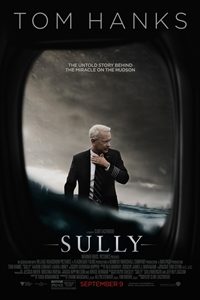 “Sully” is a new American hero Hollywood needs
By Kaely Monahan
“Sully” is a new American hero Hollywood needs
By Kaely Monahan
If you have a fear of flying then, “Sully” is not the film for you. Or perhaps it is. Based on the incredible 2009 water landing of U.S. Airways flight 1549 into the Hudson river, the story is one that will live on in America lore and FAA logs forever. If you ever find yourself crash landing, this film will make you want Sully in the cockpit.
But before I go on, a disclaimer: My father is a U.S. Airways pilot—now American Airlines. (In case you have forgotten, U.S. Airways bought the legacy carrier in 2015.) Due to some insider airline politics, I perhaps know a little too much about the facts of this event. Therefore, I see the film through the rosy-colored glasses director Clint Eastwood puts on.
Does the film accurately portray what happened? Yes, and no. But ultimately, this is a work of fiction based on real life. What biopic film ever gets things 100 percent correct?
That said, “Sully” is a masterful work of cinematic art. From the scripting to the casting, the film has you gripping your seat. This is the type of hero movie we need.
Eastwood approaches the story Captain Chelsey “Sully” Sullenberger’s (Tom Hanks) story in an unconventional way. Instead of starting with the landing, we are confronted by Sully who is second guessing what he did. Was his decision sound? Did he truly have no real option other than landing in the Hudson?
For those who don’t recall, Flight 1549 had taken off from LaGuardia in New York City and was headed for Charlotte, N.C. Shortly after take-off, and not yet at cruising altitude, they hit a flock of birds. This damaged both engines. Losing altitude, Sully attempted to return to LaGuardia but was unable to. He made the decisive decision to land in the Hudson—the only clear area that was long enough to accommodate a forced landing of an Airbus A320.
The survival rate of water landings is historically low, but miraculously Sully managed to land the plane safely. Every passenger was rescued with only minor injuries reported. Such a feat had never been done before.
However, Sully and his co-pilot Jeff Skiles (Aaron Eckhart) end up under investigation by the National Transportation Security Board—as is protocol. As this film is based on true events, Eastwood needed to invent a “bad guy.” The NTSB was his choice.
Painted through Eastwood’s eyes, the federal agency appears conniving, vindictive and determined to prosecute Sully and Skiles. A fact that is very much fabricated. Anyone who has sat through a government hearing will know how methodically boring and tedious such meetings are.
As the investigation carries on, we see the events of the landing slowly pieced together throughout the film so that by the end, we see what really happened. Throughout the film, Sully struggles with his choice but sticks to his story. He did everything he could and he stands by that decision. The movie culminates with a hearing with the NTSB, which is again portrayed as the nasty villain. (An unsurprising move as the government is a popular choice for a baddie these days.)
In the end, the martyred Sully is vindicated, and his hero-ship firmly tacked on.
Tom Hanks is brooding, psychologically challenged but cool. He fits the mold of the perfect hero captain—a modern day Moses—he leads his “people” through calamity into ultimate glory. He can do no wrong. Much of this film is cerebral, as Sully struggles with his decisions.
Interestingly, this film is almost devoid of music. Its lack lends a certain gravitas to the story. This is not some action-packed, explosion-riddled thriller. This is a psychological thriller. Much of the action is seeing through flashbacks, daydreams, and nightmares.
The story unfolds nonlinearly, which can be challenging. But Eastwood proves he still has it, even at 86-years-old. It’s also clear he is in love with Sully’s story. The hero who faces the scorn of the world and wins.
Despite the Hollywood-ization of the facts, “Sully” fills the need to see a “believable” hero movie. I, despite my reservations, found myself lulled by Eastwood’s “Sully” to the point that I was cheering for the captain at the end. Sometimes, it’s better to know less about our heroes than more.
- Kaely Monahan is a journalist, graduate of City University London and the creator of Popcorn Fan Film Reviews. Follow her @PopcornFans and @KaelyMonahan.









